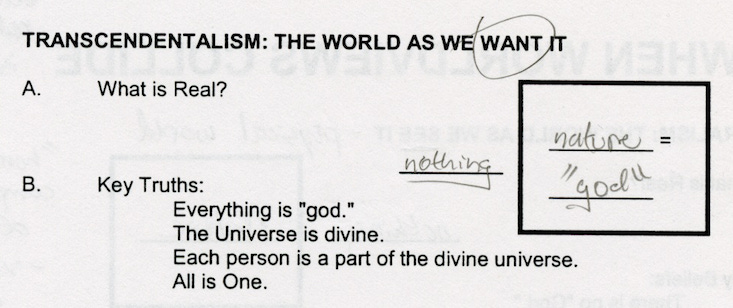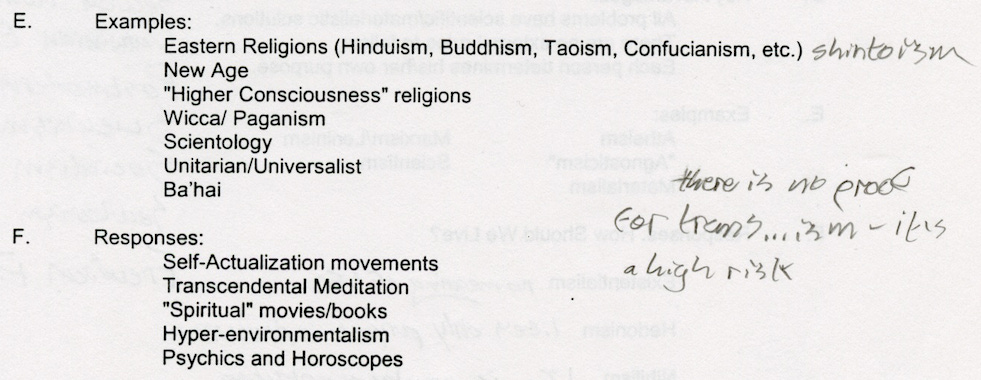Thinking Worldviewishly, pt. 2: Transcendentalism
The second half of the first day, part two of three.
A bit of time has passed since I last asked you to stay tuned, but I’m so glad to be back here writing these. I’ll continue to do so whenever it feels right to spend time with this material.
Last time, we covered One of the Three categories all worldviews are sorted into: Naturalism, which for the purposes of this reductive triptych is a sort of junk drawer of all non-god-based views, from Atheism (sure, definitely a belief in the non-existence of a god) to Communism (a governmental structure), to Darwinian Evolution (a scientific theory), to Postmodernism, which in Evangelical circles is itself also a sort of junk drawer of what is probably better categorized outside said circles as ‘modern philosophy’, I guess?
Thankfully, the other two groups here are more religious in nature and don’t have to glom together an assortment of nonreligious (or explicitly scientific) concepts.
It’s possible that you might not have been expecting Transcendentalism to be one of the three major Worldview categories, but here we are. This is not ‘Transcendentalism’ as defined on the Wikipedia page for Transcendentalism, but instead as a catchall for any religion that does not explicitly characterize a single god-figure who has conscious intent. Evangelicalism needs to create distance here because it is entirely reliant upon the existence of a God who consciously sets the terms of both condemnation and forgiveness.
Much as Naturalism distances Evangelicalism from uncertainty as to the existence of a god, the Transcendentalism section is here to distance us from uncertainty as to the characterization of God.
Let’s dive in. The opener of ‘Nothing is Real’ doesn’t really rock the boat on its own, but the Key Truths section, for a kid raised Evangelical, is plenty scary:

“Key Truths” like the scare-quotes-enhanced “everything is ‘god’” and “Each person is a part of the divine universe” might sound pretty nice to you, depending on your background – but remember, the audience of this material is a bunch of saved Christian kids, who have been told they were born in sin – and whose sins were forgiven by a conscious, individual, separate being cleansing them of said sins.
To Evangelicals – to me, at the time – the blurring of oneself into the everything-ness of the universe and the blurring of God into everything-is-god are fundamentally terrifying concepts, because they removes both the above-creation nature of oneself – “a little lower than the angels” [Heb 2:7, straight from my memory, thanks] and the personhood of God as the ultimate arbiter of our salvation.
The concept of capital-T Truth (here equivocated with rationality, despite the concept of ‘rationality’ not being mentioned in the Naturalism segment) as instead subjective, personal “truth” and emotionally-charged “morality” also carries implicit danger to the Evangelical. Again, these very scary concepts to a belief system that hinges one’s eternal soul on the approval of an external being and a universal set of moral standards.
The Key Advantages section also contains some subtext that requires unpacking, as they might seem innocuous at a glance:
“All problems have spiritual solutions” might sound pretty Christian, but in this context it’s intended to frame this worldview as naive.
“No external rules to follow” is gesturing at the common concept that without God guiding the basics of morality, society would descend into chaos. Sure, I could try the cheap shot of pointing at all of the societies where that seems to not be the case, but Evangelicals have an answer to that, so we’ll move on.
“Each person determines own purpose (‘look within’)” might sound pretty innocuous – positive, even! Maybe a therapist has even said something like that to you! But:
Well. Keep this point in mind as we’ll be coming back to it repeatedly in this blog: I can’t emphasize enough how important it is for Evangelicalism to discourage looking within oneself and determining your own purpose. The whole system requires that you view yourself as irreparably flawed, and requires that you submit yourself to God, the only being that can save you. It is a system of brokenness, not self-determination; of control, not liberation.

Let’s move on to our Examples section, which is just a rundown of some hot non-monotheistic belief systems that would get Christians’ hackles up in the late 20th century. I assume the 2022 version of this has probably dropped Wicca, but who knows. Unitarianism is actually Christian and monotheistic, but it’s here due to its stance on capital-t Truth (remember, these sections exist primarily to create distance from Evangelicalism).
The “Responses” list here is notable due to its reach: psychics, horoscopes and TM fueled plenty of Moral Majority outrage in the latter half of the 20th century, so you’d expect those here, but “’Spiritual’ movies/books” and “Hyper-environmentalism” are anything and everything they’re needed to be. Did my family skip The Lion King due to its “New Age content”? You bet. Did anything “environmentalist” set off a siren in my head for all of my childhood? My friend, I wasn’t allowed to watch Fern Gully and the only reason I know the Captain Planet theme song is because the credits played right before Garfield and Friends. Don’t worry, there was an entire Environmentalism session later in the camp; we’ll get there.
Some of the above fear is quaint; my family now would downplay The Lion King and probably don’t remember Fern Gully. However, another common theme from post to post here will be the slipperiness of these terms: the fuel of Evangelicalism is a terrifying, binary eternal fate and rigid, absolutist, literalist view of the Bible & God, but it’s all propped up by a network of extremely flexible terms & systems of thought.
The ‘Biblical Perspective’ segment here is interesting for a couple of reasons that won’t be immediately evident to someone not familiar with Evangelical culture. For one, Genesis 1 is listed here in its entirety; this is simply a shorthand for belief in a literal creation narrative, which is essential to Evangelicalism’s moral system (we’ll get into that later, I promise). Secondly, there’s only one other Old Testament scripture represented here, and it’s the reliable Isaiah 44:24, which is a common reference for antiabortion groups, as it reads in part “[…] the LORD […] formed you in the womb”.
As for the phrasing, an “unreal perspective” might seem like awkward word choice, but it’s very intentional: for Evangelicals, the basis for all reality is the Bible: not as a guidebook, not as a source of wisdom, not even as simply the most holy book, but as the inerrant, literal Word of God. Given this basis, even indirect Biblical counterpoints are sufficient to decry something as “unreal”. Everything is measured against the Bible; the Bible itself is the source of measurement.
And as for “self-centered perspective”, that’s a restatement of prior scary concepts – remember what I said about discouraging looking within oneself? Here we are again.
Finally, let’s drop the hammer.
Honestly, two decades later, I’m pretty amused with how hard this Transcendentalism section has to work to make itself ominous to its audience. Here we have its 3 Key Problems:
“No Ultimate Basis for Moral Judgements” is a simple restatement of prior concepts – as we discussed earlier, Absolute Truth is a necessary component of the binary salvation system.
“No Allowance for Logical Scrutiny” is a bit of a stretch, intended to portray the unscientific, irrational nature of these belief systems – remember “All problems have spiritual solutions” from earlier? Same deal here. I’m fairly certain members of the above listed religions may contest this portrayal. A pretty weak number 2 Key Problem, if you ask me.
“Exalted and Unrealistic View of Humans and Animals” – friend, honestly, this rules. This blog will be a downer more often than not, I expect, so I really appreciate when I get to a line that’s a little unhinged in a relatively harmless way. Let me break this one down further. Let’s live a little.
It’s really doing double duty. Removing “Humans” and simply stating “Exalted and Unrealistic View of Animals” might make more sense to the layman – you’d expect that it’s referring to idols, right? Or Egyptian gods with wings & such? Sure, but it’s also a very broad gesture at how this worldview group doesn’t respect a crucial concept: that humans are created in the image of God, and nothing else is. This isn’t just referring to ancient religions that worship or exalt animals – it’s also gesturing at the same vague notion of ‘too much value given to animals’ as the ‘Hyper-environmentalism’ phrase a few sections back. It’s definitely calling out evolution. Packed into this Key Problem is the existential & spiritual threat of blurring the line between a human’s value and an animal’s.
So, you might ask, why is the Key Problem an “Exalted and Unrealistic View of Humans and Animals”? Didn’t I, your kind author, quote a passage earlier in which humans are “a little lower than the angels”? Aren’t humans special? Well, the doctrine of Original Sin – that is, that Eve ate of the fruit of the knowledge of good and evil and cursed humanity forever (remember, this is a belief system in which all of this is extremely literal, Eden was real, we’ll get there, don’t worry) – that doctrine means while humans are God’s special creation, they are also worthless without God. God saving you isn’t simply the thing that lands you in heaven – it’s the thing that gives you worth.
Evangelicalism, as a system of control, requires that your worth be defined externally from your person. A worldview that exalts humans – one that tells you you can “look inside” for answers, one in which God is anything other than a separate & ultimate being holding your fate in his hands – threatens that dynamic. That is why that line is heavy enough to be the final Key Problem for the Transcendentalism section.
Thanks for reading, friend. As I write this blog, I will dig up memories of my experiences at the time as they feel appropriate, but I’m realizing that there’s plenty of work to be done (look at this word count! I bet it’s a lot) simply unpacking the subtext & subcultural terminology crammed into these otherwise fairly brief printouts. It’s valuable for me to look back and peel all this apart while safely buffered by 20 years of space and growth, and if this provides even a fraction of value to you along the way, I’ll find that so, so gratifying.
Next time: Theism.






